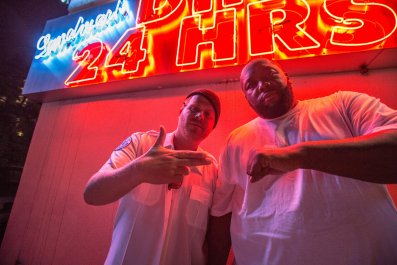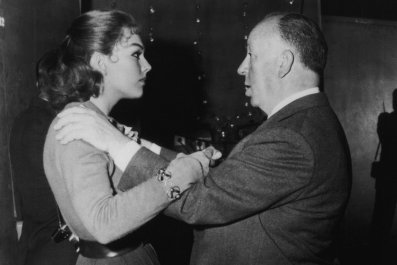"One time I almost hit Steve Buscemi with my moped."
Nicholas Megalis and I have known each for only 20 minutes but already our conversation has veered way off course, into an anecdote that ends with the 26-year-old comedian/videographer/musician/writer executing a flawless Buscemi impression while imagining a hypothetical in which the two exchange cell numbers to follow up on Buscemi's moped-related injuries.
Megalis's ability to craft this impromptu 10-second comedy bit comes as no surprise. Just three years after the launch of Vine—a Twitter-owned social network for six-second looping videos—Megalis is one of the app's most popular users. His 4.7 million followers display an enthusiasm that rivals the Beliebers, and he's snagged advertising deals with everyone from Coca-Cola to Ford. Megalis's first book, a hefty, illustrated-memoir-meets-short-story-collection called Mega Weird, goes on sale March 31.
Megalis started making Vines in 2013, after a serious skateboarding injury left him housebound for several months—as he puts it, "concrete plus teeth equals a bad night." His six-second shorts, which have evolved over the years to include props and elaborate setups, run the gamut from looping rap lyrics to quickie impressions of hipsters, moms and celebrities, plus a series of weirder bits, like "The CEO of Mustard." Standing concepts include TMZ parodies in which Megalis shouts celebrity-related questions at fleeing animals, and "I don't know the words," where he flubs his way through popular melodies. Megalis's best known Vine, which has more than 20 million loops to date, is a six-second rap about gummy worms.
At its launch, Vine wasn't marketed as a haven for the comedic—the app's initial promotions suggested sweeping landscape videos—but the network has been dominated by comedians, artists and stop-motion filmmakers, who spend hours, days or even months crafting short films. The app has also changed. Original Vine didn't allow users to pull in video from their camera roll or to edit footage; everything had to be made in one go. Those were the days when you could shoot for 12 hours and end up losing all of it, Megalis tells me wistfully. "Now people use green screens," he says. "Actual green screens."
Megalis inherited his love of the theatrical from his father, whom he mentions more times in our two hours together than most 26-year-olds would in two months. Tom Megalis is an animator, director, actor, painter, writer and designer, and, like the rest of the Megalis family, has a Vine account (with more than 86,000 followers). He's also responsible for the illustrations in Mega Weird.
Megalis's mother, a graphic designer whom he lovingly describes in the book as "little as shit" (and upon whose eyes he swears when hammering home a point), still mails perishable care packages from Ohio to Megalis's apartment in Brooklyn, New York. When Megalis was a kid, his dad built sets for his magic shows, performed in the family room while his younger sister flicked the light to simulate a strobe effect. "I felt like I was performing for 5 million people even then," Megalis says. "It's a psychosis, really."
After graduating from high school—"I think I had the worst attendance in my high school's history"—Megalis went on tour with his band, Nicholas Megalis. He moved to New York two years later, in 2009, and lived off money he made writing commercial jingles. (Without prompting, Megalis rattles off a song he wrote for acne medication: "Acne, acne, what the heck is acne? It's pimples on your face, and it's really distracting. Process the pimple: It's a hormone imbalance. Wash your face right now, or it becomes a zit palace.")
Today Megalis makes Vines with what he calls his "art crew," which includes his creative partner, a sweet and quiet fashion designer/stylist who helps him with camera angles, costumes and makeup. Megalis alludes to having turned down movie roles, television parts and record deals over the last few years, but decided to write a book after being approached by publisher Judith Regan, perhaps best known for getting fired by HarperCollins for trying to publish O.J. Simpson's pseudo-confession memoirIf I Did It—it was later published, and she eventually won a $10 million settlement from News Corp. Regan launched her own publishing house, Regan Arts, last year. Other recent titles include Michael Weiss and Hassan Hassan's best-selling ISIS: Inside the Army of Terror.
"I have an appreciation for male adolescent humor, which I think [Mega Weird] definitely has," says Regan, who describes Megalis as "My Big Fat Greek Wedding meets Beavis and Butt-head.… But I also love his vulnerability. I love his anxiety; I just love his point of view. I don't love every book I publish, and this is one I fell in love with."
Mega Weird is in some ways an extension of Megalis's Vine persona—it's earnest and quirky and artistic. But it's also far more intimate. Megalis tells me he doesn't consider it a book for children (many of his fans are young), and I both agree and don't. Mega Weird is profanity-laced and some of its stories are at best PG-13, but the book also has a youthfulness that makes it feel like a letter from Megalis now to Megalis of 10 years ago. "They will call you 'different,' they will call you 'weird' and hallelujah!" reads the book's prologue. "Take it as a sign that you are doing something right."
"If I could speak to myself right now, like go back in time and talk to myself at 14 years old, I would say, 'Dude, Nick, pay attention for one second, OK? Don't stop doing voices. Don't stop drawing. Don't stop making comedy videos after school,'" Megalis tells me. "It was the groundwork for my future."
It's hard to imagine Megalis as an outcast. He warns me early in our chat that he's loud—a loud talker, a loud laugher—but that volume comes across as more of a boisterous enthusiasm that manifests in everything from smiles at strangers to effusive compliments for the waiter who keeps popping by to refill our water glasses. It's a gregariousness that makes Megalis the only person I've ever seen hang on to their Starbucks cup in a restaurant without earning dirty looks from the wait staff. It also strikes me as exhausting for a New Yorker.
When I ask Megalis if he's keen on what seems a logical next step in his career—a TV show—he launches into a series of a hypothetical questions. Would he be allowed to choose the cast? The crew? Would he have complete authority over the show and everything related to it? "Nobody is going to love your work more than you," he says of editorial control. "Nobody is going to lose sleep over it more than you."
That reticence disappears when Megalis starts talking about Meerkat, a month-old app that lets users stream live video from their phone cameras and promote it via Twitter, a sort of Snapchat meets Livestream that he describes as "a new outlet for unedited, raw, balls-to-the-wall live content" (Twitter just launched a competing app named Periscope). While Meerkat made waves at South by Southwest, and has been talked about as a groundbreaking tool for the 2016 presidential race, Megalis is using it for everything from streaming his morning coffee routine to ranting about his mom. "Meerkat is a place for the people who can improvise and really monologue," he says. "Or for insane people. One or the other, I can't tell yet."
Megalis is also working on two albums, one in his kitchen and another for a studio. He already has one full-length album, an EP and two singles on iTunes, including "Gummy Money," an extended cut of which briefly topped hip-hop charts. "I've written a bunch of albums about life and magic and falling in love and losing my mind and I've put all of this work and sweat and heart into it," he says. "And then a rap song about gummy worms goes to No. 1 in five countries."
Megalis will be doing an author event for Mega Weird at Barnes & Noble in Union Square on March 31 at 7 p.m.




























